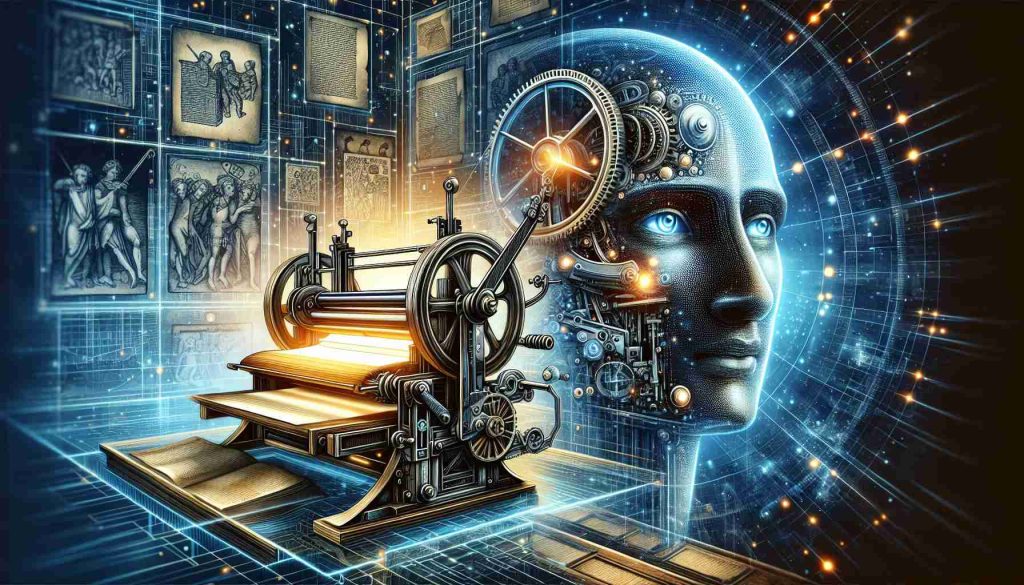
Summary: In recent discussions, J.P. Morgan Chase’s CEO Jamie Dimon likened the impact of artificial intelligence (AI) to revolutionary technological leaps such as the printing press and electricity. The bank has been using AI to enhance various services and is investing more, recognizing AI’s potential to reshape job roles and the workforce. Meanwhile, a consortium of tech firms has formed to prepare workers for the AI era, emphasizing retraining and the importance of multi-sector collaboration to harness AI’s benefits.
The CEO of J.P. Morgan Chase, Jamie Dimon, has drawn a bold parallel between the advent of artificial intelligence and the creation of the printing press, underscoring the transformative effect AI is poised to have on the banking sector and society at large. In his annual letter to shareholders, Dimon expressed unwavering belief that AI’s influence will be profound and wide-reaching, spanning various historical breakthroughs in human achievement.
At J.P. Morgan Chase, AI applications are rapidly expanding, from streamlining operations to enhancing customer interactions. Investments in AI technologies have proven self-sustaining, with projects expected to bring efficiency that permeates nearly all job categories, albeit reshaping some roles while creating new opportunities.
This technological tide has prompted leading technology companies to establish a task force, tasked with equipping the workforce for an AI-driven future. The collaborative effort aims to proactively address the educational and training needs that emerge as industries evolve under AI’s influence.
With AI’s potential to disrupt job markets and redefine productivity, studies like those from Goldman Sachs caution of automation’s impact, signaling the nuanced challenges and opportunities AI presents. As society inches closer to AI integration, it’s clear that a strategic and inclusive approach is required to ensure that the AI revolution is advantageous to all.
Impact of AI on Industry and Market Forecasts
The industry impact of artificial intelligence cannot be overstated; it is set to revolutionize various sectors, including finance, healthcare, manufacturing, and more. In the financial sector, where J.P. Morgan Chase is a key player, AI is expected to greatly enhance efficiency, reduce fraud, and improve customer service through personalized banking experiences. Market forecasts by organizations like the International Data Corporation (IDC) predict that worldwide spending on AI could reach $110.7 billion in 2024, growing at a compound annual growth rate (CAGR) of 20.1% from 2019 to 2024.
Issues Related to the AI Industry
Despite the promising prospects of AI, there are pressing issues that need to be addressed, including ethical considerations, data privacy, and potential job displacement. As AI systems become more prevalent, questions about how they are used and who controls them are paramount. Companies and governments must work together to establish strong ethical frameworks to govern AI use.
Moreover, the potential for job displacement due to automation is a significant concern. While AI will create new job categories, it is also likely to render certain roles obsolete. Heightened attention is being placed on upskilling and retraining employees in preparation for the AI era, with an emphasis on STEM education and continual learning programs.
For the financial sector and beyond, collaborations, like the mentioned consortium of tech firms, are essential in managing transitions. By fostering a proactive atmosphere for dealing with AI-related changes — through initiatives like targeted educational programs and industry-specific training — the workforce can adapt to an increasingly AI-integrated job market. Tech companies like Microsoft and Google have been vocal about the benefits of AI while also acknowledging the challenges, leading efforts to address AI ethics and workforce preparedness.
To explore further information regarding AI’s influence on industries and markets, interested readers might visit domains such as IBM, which provides insights into AI development, or access financial analysis on the potential market growth at sites like Goldman Sachs. Additionally, for an understanding of AI policy and governance, a visit to World Economic Forum could provide comprehensive resources.
As AI continues to evolve, it is crucial to engage in discussions that revolve around the careful management and ethical deployment of AI, to ensure that its development benefits society as a whole. Recognizing the profound influence AI is slated to have on the workforce and industry calls for a balanced approach; one that weighs innovation alongside the necessity of maintaining a skilled and adaptable human workforce.
[embedded content]

Roman Perkowski is a distinguished name in the field of space exploration technology, specifically known for his work on propulsion systems for interplanetary travel. His innovative research and designs have been crucial in advancing the efficiency and reliability of spacecraft engines. Perkowski’s contributions are particularly significant in the development of sustainable and powerful propulsion methods, which are vital for long-duration space missions. His work not only pushes the boundaries of current space travel capabilities but also inspires future generations of scientists and engineers in the quest to explore the far reaches of our solar system and beyond.
